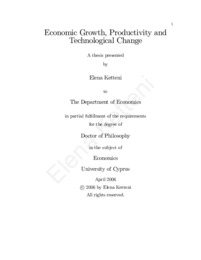Economic growth, productivity and technological change
Date
2006-06Author
Ketteni, ElenaPublisher
Πανεπιστήμιο Κύπρου, Σχολή Οικονομικών Επιστημών και Διοίκησης / University of Cyprus, Faculty of Economics and ManagementPlace of publication
CyprusGoogle Scholar check
Keyword(s):
Metadata
Show full item recordAbstract
Οι στόχοι της Διατριβής είναι: (1) να εξετάσει κατά πόσο συγκεκριμένοι δείκτες χρηματοοικονομικής ανάπτυξης επηρεάζουν την οικονομική μεγέθυνση με στόχο την εξακρίβωση μη γραμμικότητας στην σχέση αυτή; (2) να εξετάσει τη σχέση μεταξύ τεχνολογίας της πληροφορικής και παραγωγικότητας στην παρουσία κόστους προσαρμογής; Και (3) να καθορίσει κατά πόσο η τεχνολογία της πληροφορικής δημιουργεί διάκριση με βάση την ικανότητα των εργατών. Για την εξέταση των πιο πάνω στόχων χρησιμοποιούνται τρεις διαφορετικές μέθοδοι εκτίμησης. Για την εξέταση των δύο πρώτων στόχων, εφαρμόζονται μη παραμετρικές μέθοδοι ενώ ένα σύστημα εξισώσεων ζήτησης εκτιμάται μαζί με κάποιες εξισώσεις για τις αναμενόμενες τιμές για την απάντηση του τρίτου θέματος. Τα αποτελέσματα της εκτίμησης υποδεικνύουν ότι, σε αντίθεση με πρόσφατες έρευνες, η σχέση μεταξύ χρηματοοικονομικής ανάπτυξης και οικονομικής μεγέθυνσης είναι γραμμική όταν λάβουμε υπόψη μας το γεγονός ότι η σχέση μεταξύ οικονομικής μεγέθυνσης και αρχικού εισοδήματος αλλά και ανθρωπίνου κεφαλαίου είναι μη γραμμική. Όταν αγνοήσουμε τη σχέση αυτή τότε παίρνουμε μη γραμμικότητα στη σχέση που μας ενδιαφέρει. Επίσης, τα αποτελέσματα υποδεικνύουν ότι η τεχνολογία της πληροφορικής έχει μια θετική επίδραση στην παραγωγικότητα, η οποία όμως μεταβάλλεται ανάλογα με τη βιομηχανία και την χρονική περίοδο που εξετάζουμε. Επιπλέον, τα κόστη προσαρμογής παρουσιάζονται πολύ σημαντικά αφού επηρεάζουν την επίδραση αυτή στην παραγωγικότητα. Όταν τα κόστη προσαρμογής συμπεριληφθούν στο μοντέλο τότε παίρνουμε μια μη γραμμική σχέση ανάμεσα στην τεχνολογία της πληροφορικής και στην παραγωγικότητα. Όσον αφορά το τρίτο θέμα, τα αποτελέσματα υποστηρίζουν ότι η τεχνολογία της πληροφορικής οδηγεί σε διάκριση, δηλαδή αυξάνει τη ζήτηση για ειδικευμένο (πιο ικανό/μορφωμένο) εργατικό δυναμικό και μειώνει τη ζήτηση για ανειδίκευτο. The objectives of this thesis are: (1) to examine whether and how indicators of financial intermediary development influences economic growth in order to explore possible nonlinearities; (2) to investigate the relationship between information technology (IT) and economic performance in the presence of adjustment costs; and (3) to determine whether IT causes skill-biased technical change (SBTC). Three different dynamic approaches are used for the examination of the three topics under investigation, as well as the appropriate data sets. Nonparametric estimation techniques will be used for answering the questions concerning the two sources of growth mentioned above, while a system of factor demand equations derived from a general cost function will be estimated along with some price expectation processes in order to evaluate the relationship between IT and SBTC. The estimation results show that in contrast to recent research, the finance-growth relationship is linear when the previously documented nonlinearity between initial per capital income and human capital, on the one hand, and economic growth, on the other, is taken into account. When these nonlinearities are ignored, the finance-growth relationship appears nonlinear. Additionally, the results indicate that IT has a positive effect on productivity growth that varies among industries and time. Moreover, adjustment costs are important when identifying this effect since their omission tends to understate the effect of IT-capital on economic performance. Furthermore, the relationship between IT-capital and productivity appears to be nonlinear especially when adjustment costs are included in the model. Finally, the results suggest that IT does cause SBTC. The dramatic decline in the price of IT equipment that has appeared in the US economy the last decade causes the demand for skilled workers to rise and the demand for unskilled one to decline.

